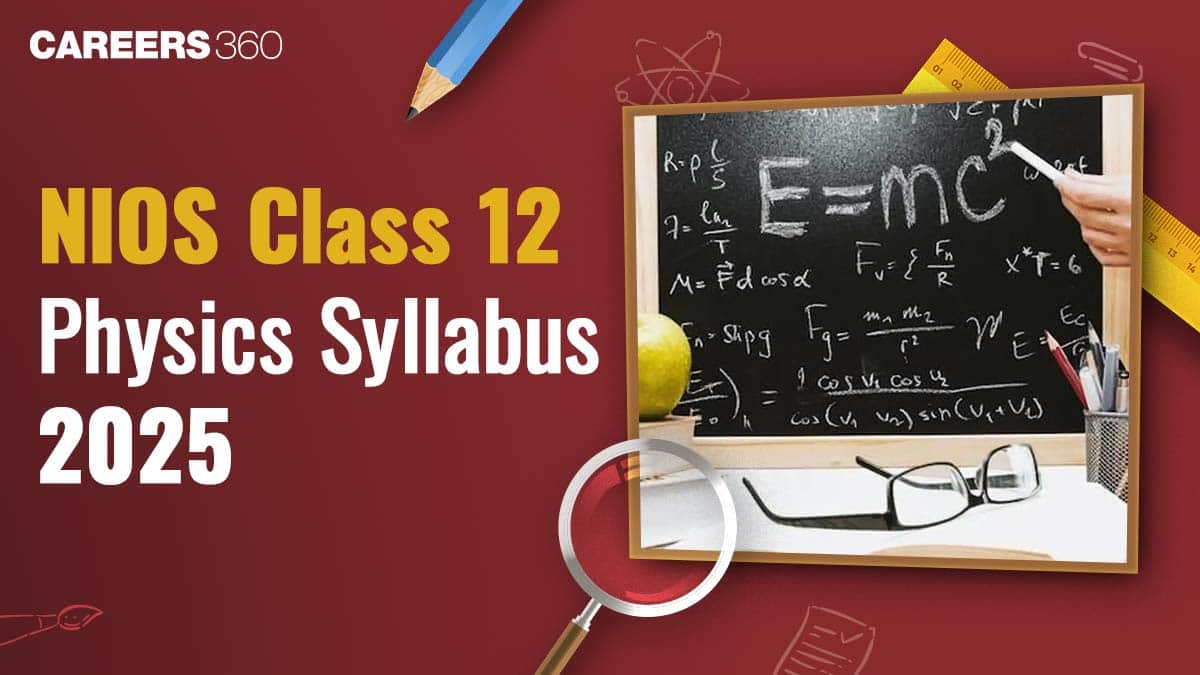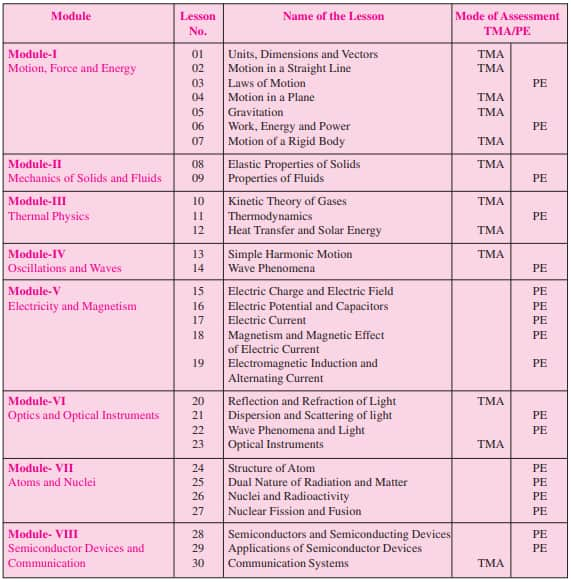NIOS Class 12 Physics Syllabus 2025 - Important Chapters & Marking Scheme
The National Institute of Open Schooling (NIOS) has released the latest 12th Class physics syllabus on the official website. The NIOS 12th physics syllabus comprises both theoretical and practical components. The NIOS Class 12 physics theory part is made up of eight core modules that cover essential physics concepts and phenomena. These modules focus on foundational topics such as mechanics, electricity, light, and other areas of physics, providing the basic knowledge required for more advanced areas of study. The final module, Module VIII, is application-oriented and focuses on specific fields like semiconductors, electronics, and communication.
This Story also Contains
- Chapters in NIOS Class 12 Physics Syllabus 2025
- Structure of the NIOS Class 12 Physics Syllabus
- Chapter Included in NIOS 12th Physics TMA Exam
- List of NIOS 12th Physics Chapters Here
- NIOS 12th Chapter Wise Marking Scheme

Chapters in NIOS Class 12 Physics Syllabus 2025
The NIOS Class 12 Physics syllabus is split into two parts for evaluation. The Tutor Marked Assignments (TMA) cover 40% of the syllabus, which includes 12 lessons, while the remaining 60% is assessed through the Public Examination, which covers 18 lessons. Check the list below for the NIOS 12th exam.
| Module | Lessons (TMA - 12) | Lessons (Public Exam - 18) |
|---|---|---|
1. Force and Energy | L-1 (Units, Dimensions & Vectors) L-2 (Motion in a Straight Line) L-4 (Motion in a Plane) L-5 (Gravitation) L-7 (Motion of a Rigid Body) | L-3 (Laws of Motion) L-6 (Work, Energy & Power) |
2. Mechanics of Solids & Fluids | L-8 (Elastic Properties of Solids) L-9 (Properties of Fluids) | (Shared between TMA content; no additional lessons) |
3. Thermal Physics | L-10 (Kinetic Theory of Gases) L-12 (Heat Transfer & Solar Energy) | L-11 (Thermodynamics) |
4. Oscillations & Waves | L-13 (Simple Harmonic Motion) | L-14 (Wave Phenomena) |
5. Electricity & Magnetism | - | L-15 (Electric Charge & Field) L-16 (Electric Potential & Capacitors) L-17 (Electric Current) L-18 (Magnetism & Magnetic Effects) L-19 (Electromagnetic Induction & AC) |
6. Optics & Optical Instruments | L-20 (Reflection & Refraction of Light) L-23 (Optical Instruments) | L-21 (Dispersion & Scattering of Light) L-22 (Wave Nature of Light) |
7. Atoms & Nuclei | - | L-24 (Structure of Atoms) L-25 (Dual Nature of Radiation & Matter) L-26 (Nuclei & Radioactivity) L-27 (Nuclear Fission & Fusion) |
8. Semiconductor Devices & Communication | L-30 (Communication System) | L-28 (Semiconductors & Devices) L-29 (Applications of Semiconductor Devices) |
Structure of the NIOS Class 12 Physics Syllabus
The NIOS Class 12 Physics syllabus is divided into three parts: two theoretical and one practical.
Part 1: Foundational Theoretical Concepts. This section covers four modules:
Module I: Motion, Force, and Energy (7 lessons)
Module II: Mechanics of Solids and Fluids (2 lessons)
Module III: Thermal Physics (3 lessons)
Module IV: Oscillations and Waves (2 lessons)
Part 2: Advanced Theoretical Concepts The second part of the course also contains four modules:
Module V: Electricity and Magnetism (5 lessons)
Module VI: Optics and Optical Instruments (4 lessons)
Module VII: Atoms and Nuclei (4 lessons)
Module VIII: Semiconductor Devices and Communication (3 lessons)
Part 3: Laboratory Work This section is dedicated to hands-on practical work to reinforce the theoretical concepts learned in Parts 1 and 2.
Chapter Included in NIOS 12th Physics TMA Exam
To simplify the NIOS public examination process, selected chapters will be evaluated solely via Tutor Marked Assignments (TMA). These include:
Units, Dimensions and Vectors
Motion in a Straight Line
Motion in a Plane
Gravitation
Motion of a Rigid Body
Elastic Properties of Solids
Kinetic Theory of Gases
Heat Transfer and Solar Energy
Simple Harmonic Motion
Reflection and Refraction of Light
Optical Instruments
Communication Systems
Also, check NIOS TMA Last Date: How to Submit it
The remaining lessons up to Module VIII will be assessed in the Public Examination.
Total Lessons = 30
Lessons for Tutor Marked Assignment (TMA) = 12
Lessons for Public Examination (PE) = 18
List of NIOS 12th Physics Chapters Here

NIOS 12th Chapter Wise Marking Scheme
| Sr. No. | Module | Marks | Minimum Study Time (hours) |
|---|---|---|---|
1 | Motion, Force and Energy | 14 | 45 |
2 | Mechanics of Solids and Fluids | 6 | 20 |
3 | Thermal Physics | 6 | 25 |
4 | Oscillations and Waves | 6 | 20 |
5 | Electricity and Magnetism | 16 | 45 |
6 | Optics and Optical Instruments | 14 | 25 |
7 | Atoms and Nuclei | 8 | 25 |
8 | Semiconductor Devices and Communication | 10 | 35 |
Total | - | 80 | 240 |
Frequently Asked Questions (FAQs)
Yes, NIOS provides a sample question paper and marking scheme/ NIOS question paper design for the 12th Class. These are downloadable from the Sample Question Paper & Marking Scheme section on the NIOS website.
There are 30 lessons total: 12 lessons (40%) for the tutor-marked assignments (TMA), and 18 lessons (60%) for the public examination.
The official NIOS 12th physics syllabus is available from the NIOS website under Online Course Material -Senior Secondary Courses - Physics (312). Students can also download the NIOS Class 12 physics syllabus from this page.
Questions related to NIOS Class 12
On Question asked by student community
Hello,
The NIOS October session theory admit card for both Class 10 and 12 is expected to be released in October 2025. You can download it from the official NIOS website, https://sdmis.nios.ac.in/, (https://sdmis.nios.ac.in/) by entering your enrollment number and selecting the hall ticket type.
I hope it will clear your
Hi dear candidate,
You can find the NIOS class 12th Business Studies and home science question papers on our official website that you can download.
Kindly refer to the links attached below:
NIOS Question Papers 2025-26: Download 10th, 12th Previous Year Paper Here
Hey Sapna:)
Thanks for reaching out!
Yes, NIOS offers physical classes called personal contact program(PCP) at its study centre across india. These classes are meant to help students of both class 10th and 12th by providing doubt clarification, practical demonstration and guidance.These sessions are usually held on weekends or holidays,
According to the eligibility criteria for JEE Advanced, the candidates must have appeared in Class 12th and scored 75% aggregate marks. For the first time, you appeared in the CBSE Class 12 board exam in 2024, and in 2025, you appeared in the 12th examination from the NIOS board and
Yes, you can definitely appear for the 12th again through NIOS with PCM subjects.
This will make you eligible for JEE exams.
However, your previous PCMB degree will still hold validity. It won't be replaced or affected by the new NIOS certificate. You'll essentially have two 12th certificates.
Important Considerations:
Applications for Admissions are open.
As per latest syllabus. Physics formulas, equations, & laws of class 11 & 12th chapters
JEE Main Important Chemistry formulas
Get nowAs per latest syllabus. Chemistry formulas, equations, & laws of class 11 & 12th chapters
JEE Main high scoring chapters and topics
Get nowAs per latest 2024 syllabus. Study 40% syllabus and score upto 100% marks in JEE
JEE Main Important Mathematics Formulas
Get nowAs per latest syllabus. Maths formulas, equations, & theorems of class 11 & 12th chapters
